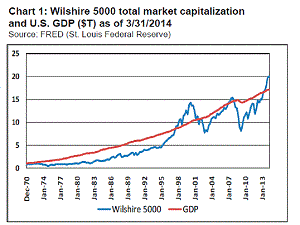Warren Buffett, one of the most successful investors for the past five decades, believes total stock market capitalization to nominal GDP of the US is "probably the best single measure of where valuations stand at any given moment," observes Joon Choi in Systems & Forecasts.
To replicate the total stock market capitalization, I used the Wilshire 5000 Total Market capitalization, which represents the market value of all stocks traded in the US.
The chart below shows the Wilshire and the US GDP from 1971. The total stock market capitalization was below the GDP level from the 1970s to the second quarter of 1997, implying that stocks may have been undervalued.
Source: FRED (St. Louis Federal Reserve). Reprinted with permission.
The Wilshire surpassed the GDP level at the end of the third quarter of 1997 and made a high in the first quarter of 2000 (30 months later).
At the end of 2006, the Wilshire rose above GDP again and made a high at the end of the third quarter of 2007 (nine months later). Total stock market capitalization rising above GDP in both instances above was followed by a massive correction.
The Wilshire penetrated the GDP level at the end of first quarter of 2013 and now stands at $20 trillion, whereas the GDP is at $17 trillion as of March 31, 2014.
Dividing the Wilshire 5000 Total Stock Capitalization by the US GDP gives a ratio between the two data series; this ratio currently stands at 1.16, which is higher than in 2007, but lower than in 2000.
I have been anticipating a stock market correction—somewhere in the mid-teens. But, in light of the Wilshire 5000 Total Stock Capitalization being greater than the GDP, I have become more cautious of the stock market. The US economy needs to gain better traction if we are to avoid a severe correction.
The problem lies in the inflation, if it continues to march higher (surpassing the Fed comfort level of 2.5%), the Fed may have no choice but to raise the short-term interest rates earlier than investors expect. This could put downward pressure on stocks, as rising rates are unfavorable for the stock market.
It may be prudent to reduce some exposure to equities, especially since many of our proprietary models have recently flashed sell signals.
Subscribe to Systems & Forecasts here…
More from MoneyShow.com:











